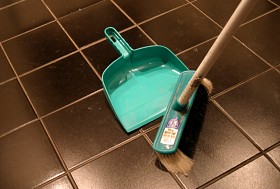5 Sweeping Statements about Brooms
 Much as we might want to deny it, housework is a basic fact of adult life. And because everyone needs at least a rudimentary path to their doorway, you can’t get much more basic than cleaning the floor. Brooms have been doing faithful floor duty for centuries and you most likely have one in your home right now. But how much do you know about this humble household implement? Choose “True” or “False” about the following five statements to find out.
Much as we might want to deny it, housework is a basic fact of adult life. And because everyone needs at least a rudimentary path to their doorway, you can’t get much more basic than cleaning the floor. Brooms have been doing faithful floor duty for centuries and you most likely have one in your home right now. But how much do you know about this humble household implement? Choose “True” or “False” about the following five statements to find out.
1. The first machine-made brooms appeared in the early 1800s.
True. Up until the turn of the 19th century, all brooms were handmade. The general procedure consisted of lashing twigs or strands of fibrous material together with twine and attaching the bundle to a wooden stick. This resulted in a rough-hewn implement that worked reasonably well on the then-fashionable dirt or stone floors, but had to be retied frequently. In the early 1800s, broom manufacture fell more and more within the scope of professionals. They began creating their product by hand sewing fibers to the broom handles. Within a few years, though, specialized machines were developed to automate this time-consuming chore.
2. Brooms work by pushing debris across the floor or other surface.
True-ish. This statement is certainly true in and of itself, but it doesn’t tell the whole story. While you may be focused on directing your ever-increasing heap of rubbish toward the dustpan or trash can, your broom is multitasking. It picks up lightweight dust, fluff, and pet hair, which cling to its bristles while heavier particles are pushed along your floor. Remember to give your broom a regular vacuuming or “comb out” (by hand or with a purpose-built broom-cleaning brush) to remove all the clingy stuff and keep it cleaning efficiently.
3. Natural fiber corn brooms are best for cleaning your hardwood floors.
False. Sturdy natural corn brooms, which are manufactured from the fibers of the appropriately named broomcorn (a tough plant resembling sweet corn), are ideal for heavy duty sweeping jobs -- patios and mudrooms, for example. However, they are just too much for your elegant – and expensive – wood floors. Because corn brooms tend to scratch and dull delicate surfaces, it’s best to choose a softer bristle, such as natural Tampico made of Mexican agave, gentle synthetic fiber, or a cotton-loop dust mop, for this type of cleanup.
4. With vacuum cleaners and robots, brooms are becoming obsolete.
False. Brooms are maintaining their popularity for many reasons. They are greener than Hoovers, Roombas, uprights, canisters, or mini-vacs. The only energy they require is a renewable resource: elbow grease! And they’re 99.99 percent free of noise pollution. A broom is also simpler to store and to move around your house or apartment; you’re not limited by the length of a cord. What’s more, a good broom handles jobs many vacuums would choke on, including the messiest toddler food spills. They’re cheaper and longer-lasting, too, and can easily be recycled once their work life finally comes to an end. And of course, brooms are de rigueur for rural homesteaders and vacationers in rustic cabins with no electricity (if those exist anymore).
5. Brooms are so versatile you can even use one to mop the floor.
True. In many European countries, folks commonly wash the floor with a push broom and a bucket of warm soapy water. Convenient for Continentals who hate housework (and who doesn’t?), this trick allows Parisians or Amsterdammers to sweep and mop at the same time. It will work just as well on your Cleveland tile, laminate, or wood floor. Draping the broom with a cleaning cloth or old towel is optional. Alternatively, resourceful rubber brooms do a great job of scrubbing, squeegeeing, and sweeping all types of floors including carpet, indoors and out.
Laura Firszt writes for networx.com.
Updated March 29, 2018.
Looking for a Pro? Call us (866) 441-6648

Cleaning Average Costs
Cleaning Services Experiences

Laminate Flooring Installation In A Sunken Living Room

Hardwood Floor Repair Done Perfectly AND Painlessly



